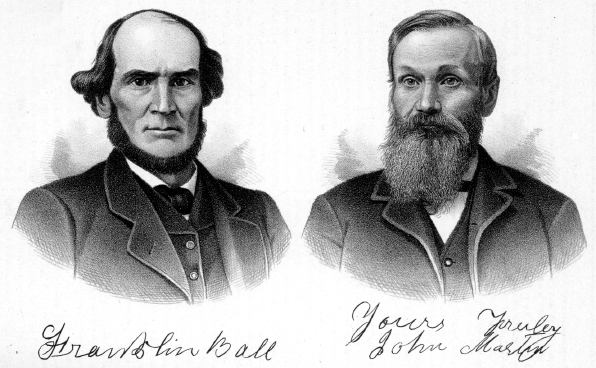to Ohio; there the father was
prospered in his labors as an agriculturist and
accumulated a fine property. He rested from his
earthly labors in the year 1868, at the age of
seventy-six years and five months. The mother survived
her husband a period of eight years, her death taking
place in 1876, when she was eighty-one years old; she,
like her husband, was of noble birth. Our subject's
brothers, Michael and George, are both residents of
Coshocton County, Ohio, have large families, and are
in good circumstances.
Capt. Martine was born near the city
of Strasburg, in the Province of Alsace Lorraine,
France, Nov. 30, 1830, but when brought to America was
too young to have retained any recollection of his
native place. He grew up on the farm in Ohio, although
he had begun his education in the city schools of
Philadelphia. After the removal of the family to Ohio,
where they were among the early pioneers, young
Martine was obliged to travel three miles through the
woods, climbing over logs three or four feet in
diameter, through bush and bramble, to reach the
temple of learning. Limited as his opportunities were,
however, he appreciated them and kept his place at the
head of his class. When not in school his services
were utilized around the homestead, where he remained
until his marriage, Aug. 30, 1852. The lady who at
that time became the wife of our subject was Miss Mary
Ann Bordenkarker, who was also of French birth and
parentage, and by whom he became the father of six
children. They lived upon a farm in Lyndon Township,
Coshocton Co., Ohio, until the outbreak of the Civil
War. Before his enlistment the Captain went to
Corinth, Miss, to take care of a brother-in-law who
was dangerously ill, but who died before he could
reach him. Immediately upon his return home, his
sympathies being now doubly enlisted in the cause of
the Union, he assisted in the organization of a
company made up mostly from the young men and boys of
his own neighborhood, with whom he had previously
drilled. This was Company C, and was a part of the
80th Ohio Infantry. He went with them to the front,
but at Corinth was taken seriously ill, and obliged to
accept his honorable discharge. He did not by any
means, however, intend to give up the fight, and as
soon as his health would permit he left his sick bed
and organized Company K of the 1st Ohio Militia, and
of which he was elected Captain, receiving a
five-years commission from Gov. Todd, then Governor of
Ohio. He participated in the efforts made to capture
Morgan while on his raid through Ohio, after that did
guard duty in different parts of the State, and the
regiment was subsequently disbanded.
After the close of the war Capt.
Martine removed with his family, in September, 1865,
to Brown County, Ill., but staid there only about two
years, next crossing the Mississippi and settling in
Nebraska City. Here our subject was Superintendent of
a section of the Council Bluffs & St. Joseph
Railroad, which was then in process of construction.
Later he had the supervision of a company of men
working in the Summit cut on the Midland Pacific. In
the year 1868 he purchased the land which he now owns
and occupies, and thereafter gave his attention to it.
Here the wife and mother died, at the age of forty
years, March 8, 1875. The six children of this
marriage were named respectively: John, Jr., George,
Maria, Jacob, Maude Lena and Ella. John married Miss
Rosa Morgan, is farming in the vicinity of Syracuse,
and is the father of two children; George married Miss
L. Anderson, lives on a farm in Otoe Precinct, and has
three children -- George, Lena and Joseph; Maria is
the wife of Benjamin Griffin, of Buffalo County, and
the mother of three children; Maude Lena married James
White, of this county, lives on a farm in Russell
Precinct, and is the mother of three children; Ella
married Otis Brown, is a resident of Otoe Precinct and
the mother of three children -- Howard, Dessie and
John; Jacob is married, and farming in Custer County,
this State.
Capt. Martine, on the 12th of May,
1876, contracted a second marriage, with Miss Lucy
Scherrer, a native of Baden, Germany, and who became
the mother of three children, only one of whom is
living, a daughter, Mary, who resides with her father
at home. Mrs. Lucy Martine departed this life at her
home in Otoe Precinct, Nov. 8, 1880, aged thirty-seven
years. Capt. Martine, Aug. 16, 1883, was married to
Mrs. Elizabeth High, nee Schuster, who was born in
Prussia, Sept. 17, 1836, and came to the United States
in 1882. She is the mother of
|


